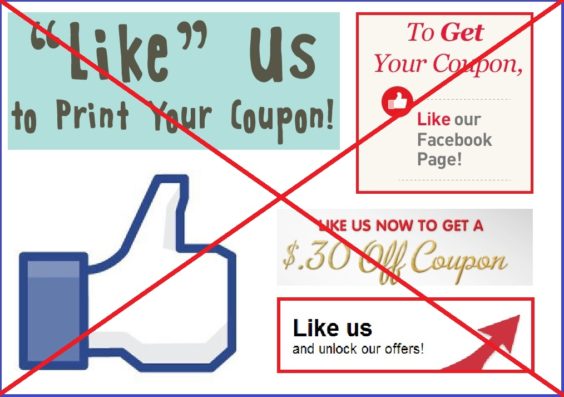How many times have you “liked” a company on Facebook, just to get your hands on a coupon? It’s become a common practice for businesses to offer coupons, freebies or other enticements in exchange for your online pledge of affection – but not anymore. Facebook is changing the rules, so companies can no longer force you to “like” them just because you like the coupon they’re promising you.
In a note to app developers, Facebook has announced that as of November 5, 2014, “you must not incentivize people to use social plugins or to like a Page. This includes offering rewards, or gating apps or app content based on whether or not a person has liked a Page.”
In other words, no one is allowed to effectively bribe you into liking them anymore.
The new rules affect a host of Facebook-based content, including contests that require a “like” to enter, games that give you bonuses in exchange for a “like”, and coupons that you can’t download unless you “like” the page first. It’s a practice that’s become known as “like-gating”.
And plenty of Facebook users have been willing to play along, “liking” pages left and right, filling their friends’ timelines with news of their fondness for various stores and brands that are offering goodies hidden behind a “like gate”. Several studies have shown that many Facebook users are pretty up front about why they “like” certain pages – they want coupons. 2012’s “RedPlum Purse String Study” found that two-thirds of those surveyed would like a page on Facebook if it meant getting a discount of 25% or more. And in a 2011 survey by the interactive marketing company ExactTarget, more than half of respondents said their likes aren’t free – they expect to receive discounts or promotions in exchange for liking a company’s page.
Companies, meanwhile, like Facebook “likes”. And lots of them. So what better way to (somewhat artificially) boost your fan base, than to offer a tempting coupon and require anyone who wants it to click that “like” button first?
In fact, entire businesses have been built around using coupons to make companies more likeable. In 2011, printable coupon leader Coupons.com unveiled “Brandcaster Social”, a new product that promised “a fast and easy way for brands to offer secure, printable coupons directly on their Facebook Fan pages” – many of them behind like gates. A printable coupon for batteries on Energizer’s Facebook page was hailed as an early success story – the campaign “resulted in 60,000 Likes in two days,” Coupons.com announced.
Printable coupon provider CoupSmart specializes in helping businesses to run marketing campaigns on social media sites like Facebook. One of its biggest success stories was a 2012 campaign for Lindt chocolate, in which the company gave away a million coupons for free chocolate on its Facebook page – in exchange for “likes”. Suddenly, Lindt became the most popular kid in class, with its Facebook fan base blossoming to well over a million before the promotion was over.
And printable coupon site Hopster launched last year, featuring the ability to “boost” coupons’ value by performing certain activities, such as signing up for companies’ newsletters, following them on Twitter – or liking them on Facebook.
Coupons.com and CoupSmart representatives have not yet responded to requests for comment on how they might adapt their business plans to the new Facebook reality. But by its own reading of Facebook’s new rules, Hopster isn’t worried. Any Hopster user already has access to its printable coupon offers, Hopster Vice President of Marketing Kris Beutel told Coupons in the News. It’s only if they choose to “boost” the coupons’ value, that users have the opportunity to earn points by liking companies’ Facebook pages. “This is not your typical ‘like-gate’ in which the entire page (or offer) is hidden until the brand is ‘liked’,” Beutel explained. “With Hopster, the action or increased save value is an option for the user and is not necessarily required to receive a coupon.”
Other companies that aimed to combine coupons, Facebook and “likes” have long since thrown in the towel altogether. Valassis gave up on its “RedPlum Social Savings” initiative, which launched in 2012 and allowed users to print, like and share RedPlum coupons directly from stores’ and advertisers’ Facebook pages. And the former PeopleString Corporation’s “ShareItUp” platform, introduced in 2011, provided brands with printable coupons that increased in value the more they were shared.
Perhaps they got out while the gettin’ was good. The value of an inflated Facebook fan base is debatable now anyway, since recent changes to Facebook’s algorithms mean that the vast majority of “fans” will never see any of their “liked” companies’ content on their timeline anyway, and will never interact with them again after printing their coupons.
So now the remaining “like-gating” companies and brands will be forced to adapt to a new reality, where “liking” a brand means exactly that – you actually do like the brand. “We want people to like Pages because they want to connect and hear from the business, not because of artificial incentives,” Facebook explains. “We believe this update will benefit people and advertisers alike.”
That is, as long as brands don’t decide it’s no longer worth it to offer coupons on Facebook at all. Then Facebook’s next innovation had better be a “dislike” button.















Wow, that is big news. I wonder if it will also change the landscape for blogger giveaways. Normally, readers will like a blog page, plus a company page as an entry. I will have to do more research.
On a separate note, those kind of giveaways might be violating bigger rules than Facebook’s – if a giveaway requires entrants to give up some form of “consideration” (like money or something of value) then it could be considered an illegal lottery. There’s no legal precedent that I’m aware of, but some argue that Facebook likes could be seen as “consideration” since they’re arguably something of value to the page owner receiving them. Of course, many blogger giveaways do this anyway, but I would not like to be the one who sets a legal precedent in such a case!
I am just about everyone I know has numerous Facebook accounts just to keep the coupons and company spam away from my family and friends feed. I have one account to get coupons and enter contests and then one that is for personal reasons like family and friends.
Plenty of people do just that, but it’s also technically in violation of Facebook’s rules – even though FB doesn’t always enforce those rules. So will it enforce the rules about no more “likes” for coupons??